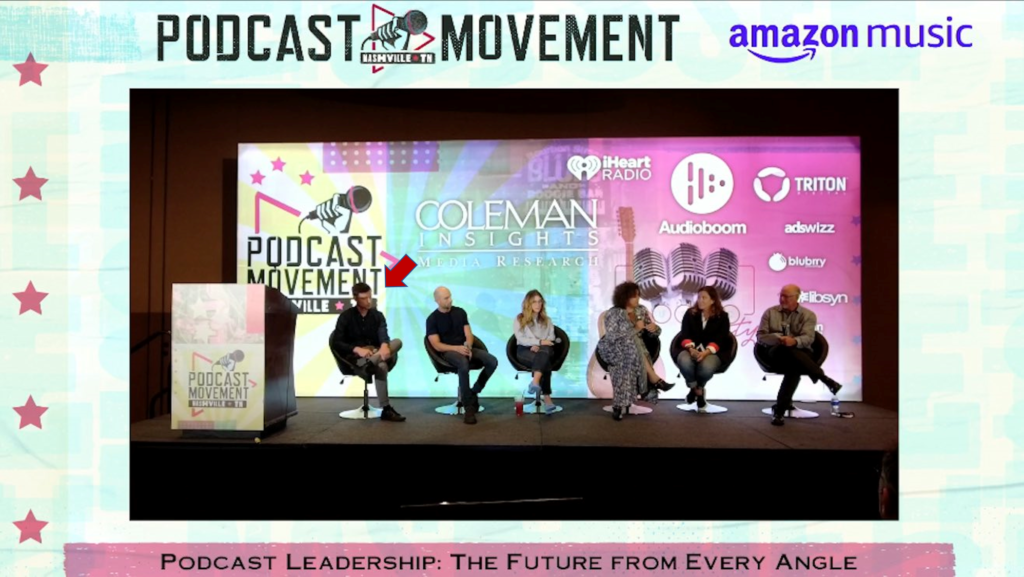
For the first time in five years, I took a pass on Podcast Movement this year. Once I heard James Cridland wasn’t going, it frankly took all the fun out of the conference for me.
Actually, I had made an earlier commitment – a make-good – to the Missouri Association of Broadcasters. Their conference in lovely Branson was on a much smaller scale than the big one in Nashville. But I will proudly tell you that unlike the people you see on Ozark, I met some of the nicest people I’ve met in radio, and I was honored to speak at their event.
Appropriately, Seth Resler represented our company at PM21, hosting his annual session, “Podcast Makeover.” And in his “Connecting the Dots” blog published yesterday, Seth provided great perspective on how this important conference has grown up – even surviving with a virtual version of itself in 2020, and with a real live gathering last week.
And there were some fascinating moments at PM21, as there always is when you gather all those energetic, creative podcasters together, even in a ridiculous hotel/conference center like the Grand Old Opry Hotel. It is one crazy, confusing place.
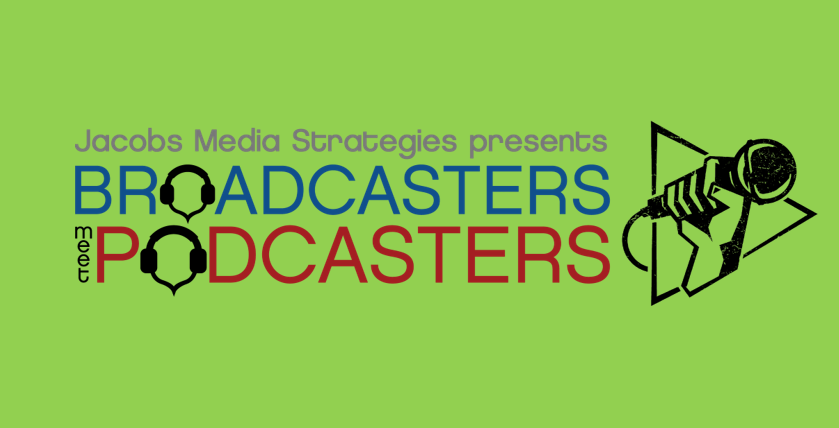 In past years, Jacobs Media has put together multi-day tracks under the banner, “Broadcasters Meet Podcasters.” That has turned out to be an altruistic idea that might have gotten a little ahead of its skis.
In past years, Jacobs Media has put together multi-day tracks under the banner, “Broadcasters Meet Podcasters.” That has turned out to be an altruistic idea that might have gotten a little ahead of its skis.
After all, we learned early on that too many broadcasters underestimated the degree of difficultly of producing competitive podcasts. Many radio people convinced themselves that because of their expertise in audio, producing podcasts wouldn’t be much more difficult than creating “Kars-4-Kids” commercials.
And podcasters were instantly wary of those corporate radio people big-footing them out of business. They reasoned that gauche, commercial broadcasters would never understand the nuances, purity, and simplicity of their precious podcasts.
But the truth is, we had some great sessions, keynotes, and panels. Jarl Mohn, Conal Byrne, Dean Cappella, Rob Walch, Eric Nuzum, Steve Lickteig, Mignon Fogarty, Rob Greenlee, Steve Goldstein, Kerri Hoffman, Dave Beasing, and scores of other pros from both sides of the aisle graced our stage these past few years.
“Broadcasters Meet Podcasters” produced myriad opportunities for both sides to learn more about the other, and along the way, some mutual respect emerged. The fact is, podcasting has proved to be an amazing audio platform, amplifying the art of audio storytelling, while offering the convenience of on-demand access. Radio, on the other hand, has managed to retain its accessibility, thanks in no small part to its ease of access and the fact there’s no monthly fees.
As we’ve witnessed over these past few years, podcast companies have proved to be smart investments for broadcasters. Perhaps the most visible of these audio unions was iHeartMedia’s purchase of Stuff Media for $55 million almost exactly three years ago. Not only did Bob Pittman purchase some wonderful content, he got a CEO czar in the deal – and a great one.
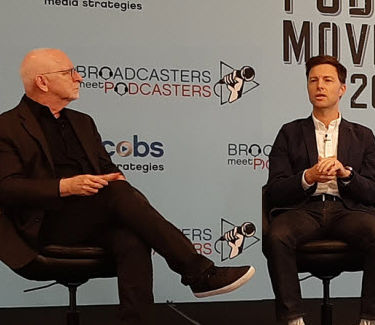 Conal Byrne is one of those rare people with the ability to straddle different worlds. He’s adept at the content creation (i.e., programming) side of the podcast spectrum, and also has considerable business acumen in the space – a rare combination. In that respect, he shares some of the same DNA that has propelled Pittman’s career.
Conal Byrne is one of those rare people with the ability to straddle different worlds. He’s adept at the content creation (i.e., programming) side of the podcast spectrum, and also has considerable business acumen in the space – a rare combination. In that respect, he shares some of the same DNA that has propelled Pittman’s career.
I was fortunate to have a “fireside chat” with Conal, shortly after the deal was consummated in 2019 in Dallas at Podcast Movement. At the time, he expressed optimism that iHeart’s armada of 850+ radio stations would prove to be marketing assets for his newly minted podcasting division.
Byrne has a deep background in digital media, but has been especially attuned to the value of broadcast radio since the iHeart deal.
When Seth reached out to us from Nashville about something he saw “in the room where it happened,” I flashed back to past gatherings of podcasters and broadcasters.
Seth was watching Steve Goldstein’s superstar panel at Podcast Movement. During the discussion, Byrne explained just how the confluence of broadcasting and podcasting has worked for the company, in some ways, much to his amazement:
“I’ve been surprised at the power of broadcast radio to market to podcast listeners, and a lot of them are new podcast listeners. When you can level 150 GRP at a new podcast for multiple weeks in a row, that’s a multimillion dollar marketing campaign that would have otherwise had to try to get there through word of mouth. In the past three years I have seen that make a big difference for us.”
In other words, “Radio works.”
Byrne’s quote (which appeared in Inside Radio) is a marker, a moment. From someone from the digital side of the street – and a true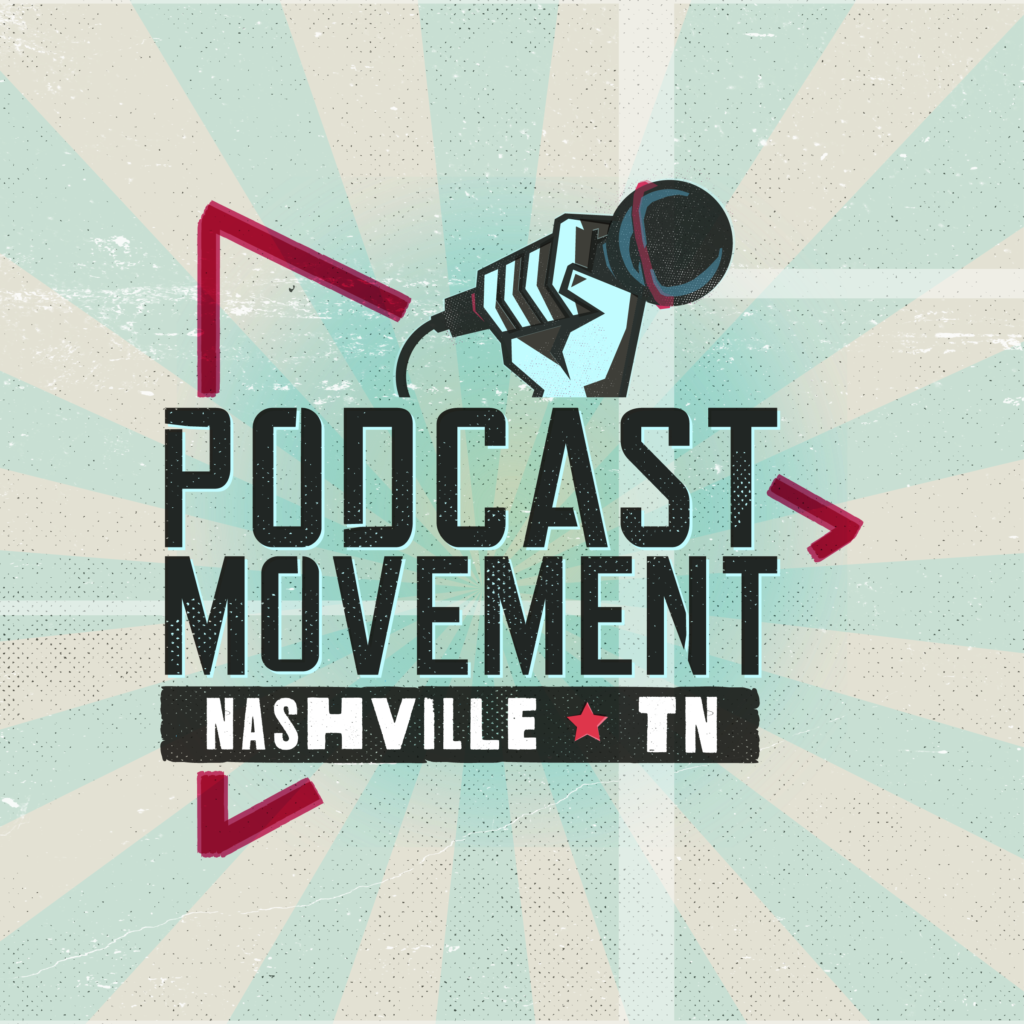 podcasting pioneer – Byrne’s proclamation isn’t just a selling point for iHeart’s quest for world domination; it is more proof that even in this media maelstrom we’re living through, radio has a solid complementary role in the podcast landscape.
podcasting pioneer – Byrne’s proclamation isn’t just a selling point for iHeart’s quest for world domination; it is more proof that even in this media maelstrom we’re living through, radio has a solid complementary role in the podcast landscape.
Finally, someone figured out how to weaponize broadcast radio. And judging by iHeart’s podcasting numbers, it works.
In the room where it happened at Podcast Movement 2021, Byrne’s testimonial for radio broadcasting and its marketing power could be a springboard for action at this week’s Morning Show Boot Camp in Chicago.
Earning even more frequent flyer miles, Goldstein will once again be on hand, introducing “The Podquest Workshop,” touted as “a new approach to developing a podcast strategy” for the hundreds of air talent on hand for MSBC 33.
I’ll be his opening act. Our air talent research study – AQ3 – kicks off Boot Camp again this year Thursday morning. Some of our findings after a year of COVID are truly eye-opening. Radio personalities have endured their most challenging year ever. Many feel overworked, underpaid, totally slammed, and time challenged.
And in this environment, how do they feel about doing a podcast? Here’s an appetizer for you – the slide below is in my deck, and Steve will use it as a jumping off point in his “Podquest Workshop.” It is a table-setter:
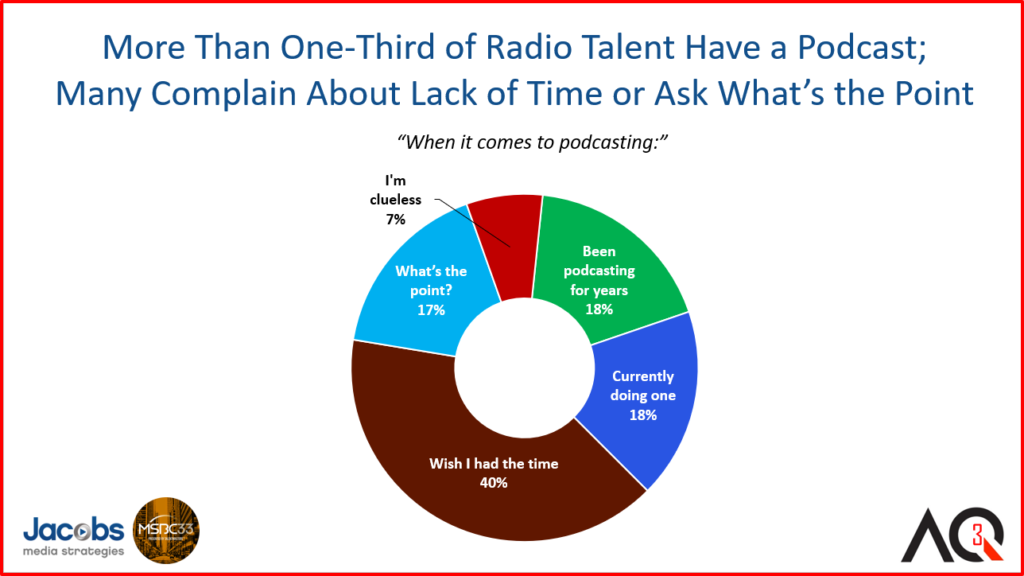
The good news? More than a third of our air talent sample have found the time to engage in podcasting. But four in ten say they just don’t have the time, while nearly a quarter don’t understand why podcasts should be part of their content regimen. Steve’s session will take on these perceptions, and I’ll be hanging around to watch his presentation.
In spite of the growing pains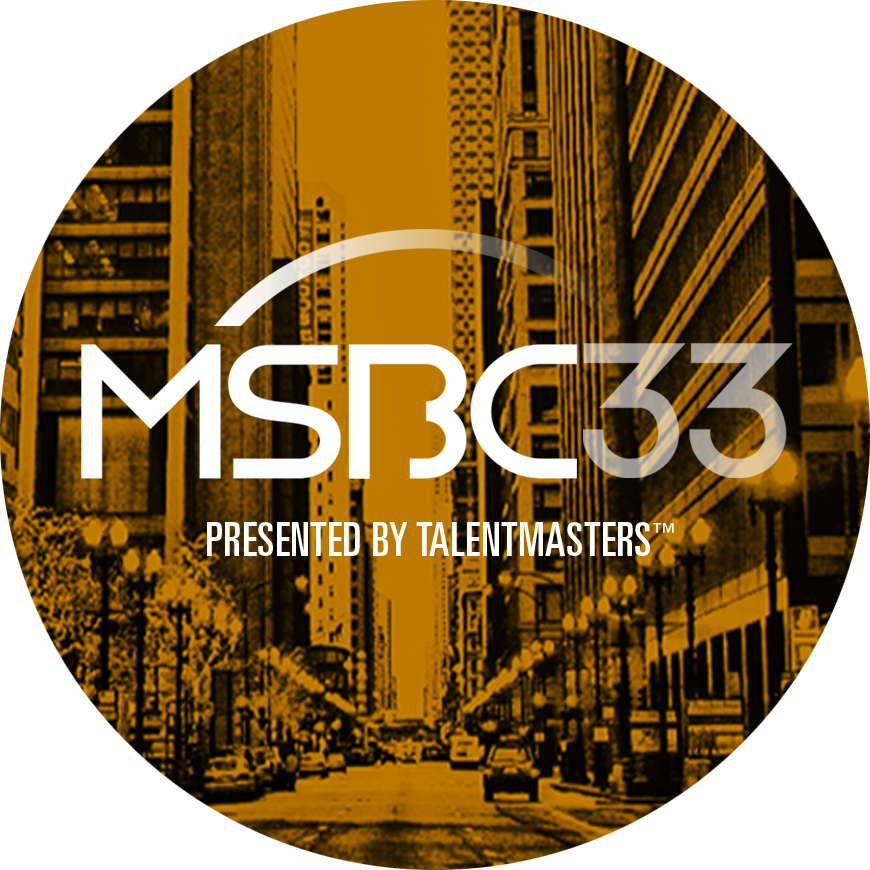 that have been so apparent in the podcasting/broadcasting relationship, we continue to see these two related audio platforms find their respective footings.
that have been so apparent in the podcasting/broadcasting relationship, we continue to see these two related audio platforms find their respective footings.
Conal Byrne’s endorsement of broadcast radio as a bona fide marketing tool for podcasts is another step in that journey.
For step 2, we hope to see you at Boot Camp.
We’re looking forward to this event in one of America’s truly great cities.
Mask up.
- What To Do If Your Radio Station Goes Through A Midlife Crisis - April 25, 2025
- A 2020 Lesson?It Could All Be Gone In A Flash - April 24, 2025
- How AI Can Give Radio Personalities More…PERSONALITY - April 23, 2025




Some random thoughts:
Imagine if Podcasting was available in the heyday of big radio stars. If people like Howard, Brandmier, Kraddick, Dees and Joyner had a weekly forum to talk about things that mattered to them for 20-45 minutes without FCC language limits. The listenership would have been huge and the advertiser support would have been too.
Sadly, the platform is there, but the radio stars, for the most part aren’t. And does anyone realize how many spots needed to complete a 150 point buy?
You raise an interesting point. I expect many of them would have gone this route. But on top of a big morning show, doing a great podcast can be heavy lift. I was actually thinking about those AM radio hosts, like J.P. McCarthy at WJR whose “Focus” shows would have made a great podcast. Good thoughts, Bob.